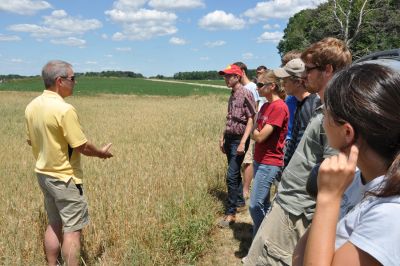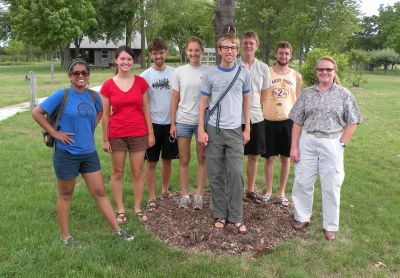Integrating Knowledge: the Scope of Food Systems

“Out of sight, out of mind” or “You don’t know what you had until its gone” ? Whether it is fields and agriculture, water, rains, the lady beetles, local food systems, or time-tested farming techniques, this question has begun to define our time together here at the Merry Lea Agroecology Summer Intensive.
This week, we began the second half of the program. This meant Monday morning involved the first lecture of the Agroecology course. Now the challenge begins – we have been participating in agriculture in action, learning about the impacts of industrialized agriculture, using soil fertility and pest management best practices, and witnessing how farmers interact with their land and customers. But in Agroecology, the task is to put it all together, and begin understanding how the dynamics of the environmental system has shaped human history, and the role we play in destroying or preserving its integrity. The classes Monday and Tuesday taught us about the evolution of agriculture, and how it is only recently that we are realizing the value and intelligence behind many traditional practices.
On Wednesday, we all enthusiastically packed into the van by 7:00 AM to meet with Doug Landis at Michigan State University, to hear about and see his research into agroecological systems and the role insects play in them. In a series of beautiful pictures and clear graphs, he explained that the natural world – what we typically understand as everything on the planet not made or controlled by humans – is not just there, existing. It is actually a fantastic system that provides many benefits to us – called in some literature ecosystem services – and we could not survive without them. The big ones are oxygen production and water transportation, but Doug’s work is on how small pockets of habitat dispersed throughout an agricultural landscape can effectively control aphid populations on soybeans, by providing a local lady beetle family to eat the aphids. So instead of these pockets of forest and natural prairie being out of sight and out of mind, we are wishing we had them back.
Every field trip so far has come with a treat. This week, ours was lunch at a Thai restaurant, and while Dale and David were left underwhelmed by their order of extremely spicy food, we all left with happy mouths and happy tummies. Doug’s hospitality continued when he showed us around his country home, demonstrating how one individual can bring a prairie and wetland back to one block of an agricultural centre.
Thursday was a day of local food systems. Paul Steury from the Goshen Farmer’s Market told us how the urbanites of Goshen are reclaiming their connections to farmers through Community Supported Agriculture. Instead of letting their food source remain out of sight, the customers and the farmers participating in the CSA and Farmer’s Market are acknowledging that they miss the mutually beneficial relationship of a farmer and an eater. In the evening, some of us saw more examples restoring what is gone when we attended a meeting of Transition Goshen on Foodsheds (after getting Chief ice-cream of course). This meeting was a discussion of how Goshen can re-create a food supply that is local in production and consumption, to restore economic and health prosperity to its community, and protect it from the uncertainties of climate change and energy scarcity. They miss what they had before 90% of Indiana’s food was imported, as it is today – an irony in a state strong in agriculture.
While some of us may have preferred that the business aspects of farming remained out of sight and mind, we all appreciated class Friday. The morning was spent with Melissa Kinsey, learning how to deliver an elevator pitch about ourselves, and other things that I will specify. The afternoon provided insights in the world of accounting, some many of us haven’t had in order to miss yet, but Michelle Horning made the process smooth and engaging.

Practicum this week highlighted that rain is a wonderful thing. We didn’t have any, but I have begun to miss rainy days like I have never before. Dale and David ended the week by putting 350 gallons of water on the permaculture garden! I didn’t know that we had water to thank for keeping our electrical fence around the field effective – the soil is so dry the grounding post is no longer getting a good contact, so this metal rod in the ground is now being irrigated as well. Unfortunately, this let some rabbits and groundhogs learn how to get into the field, and that sweet potato plants are yummy, so we are now missing several plants. In this case, brawn was needed again as we returned to the trench of the first two weeks, and filled in spots where the gravel was low.
The learning continues. We all are seeing was in which out of sight is a cause for concern – be it rain, lady beetles, or time-tested agricultural practices – and it is important to recognize, appreciate, and preserve the blessings that surround us every day.
– Posted by Caleb Gingrich, 2012 agroecology student




